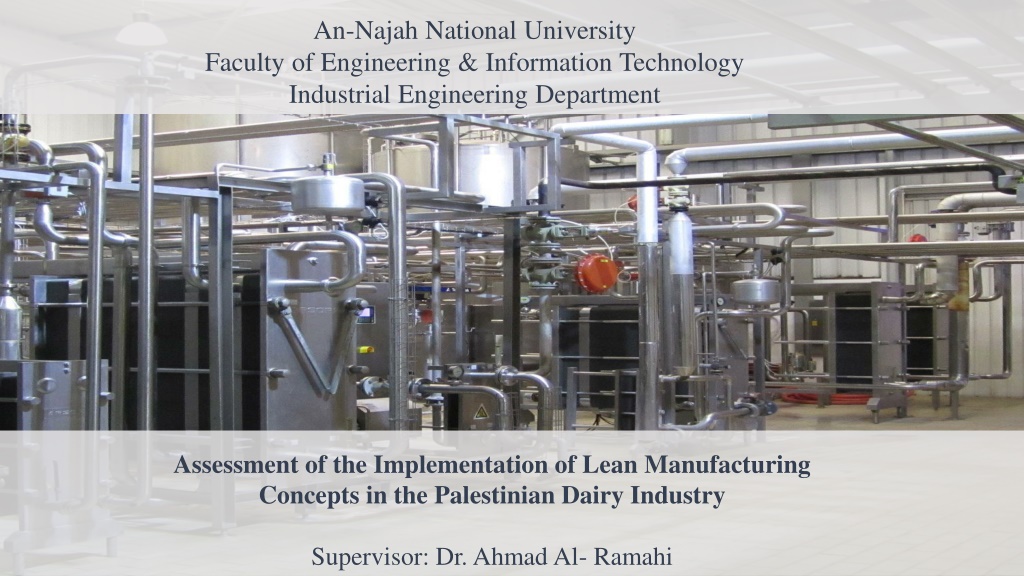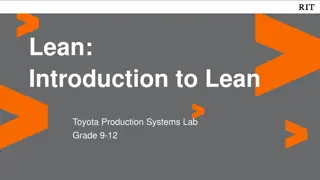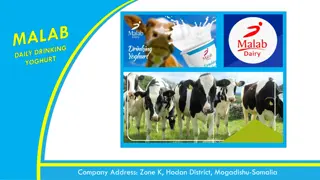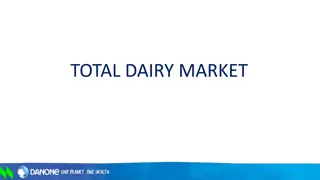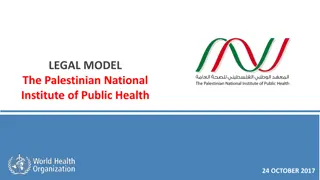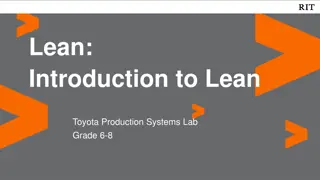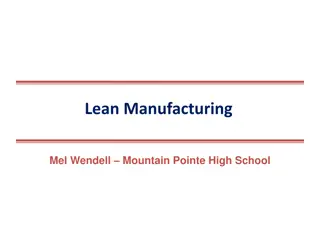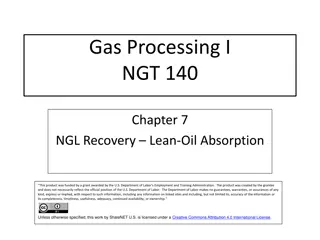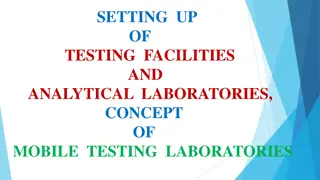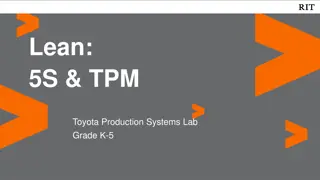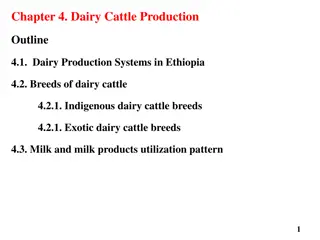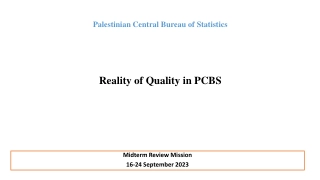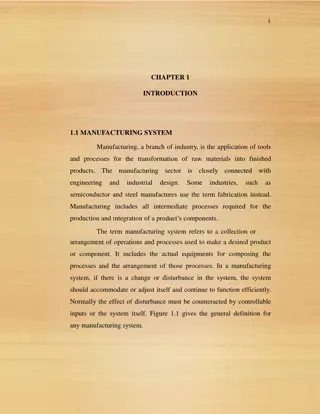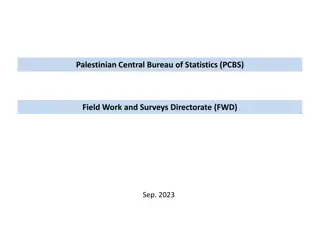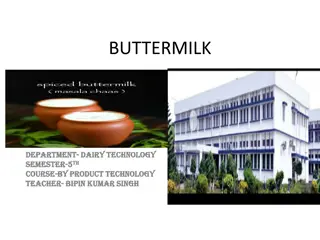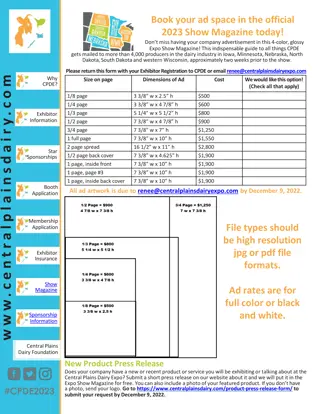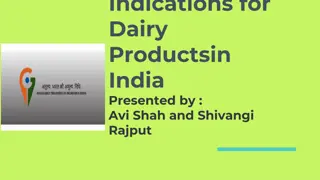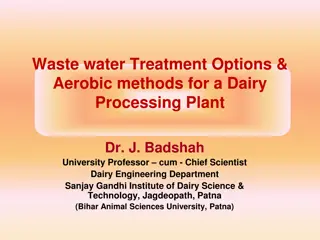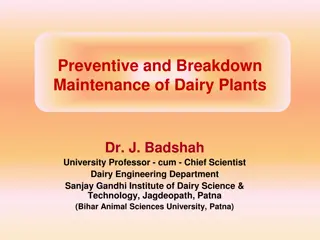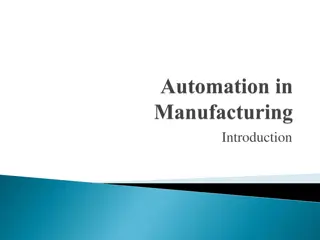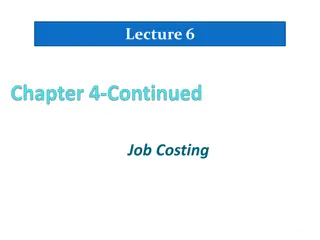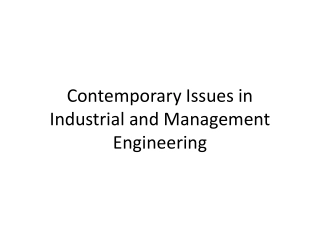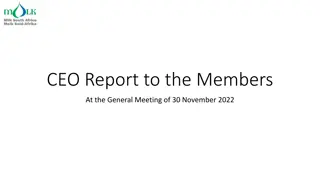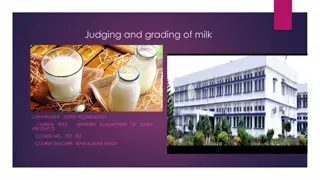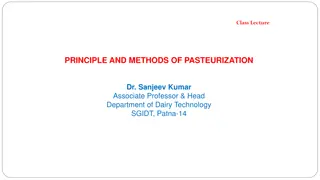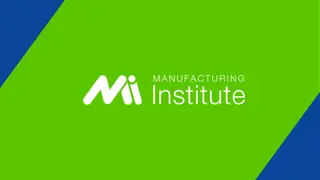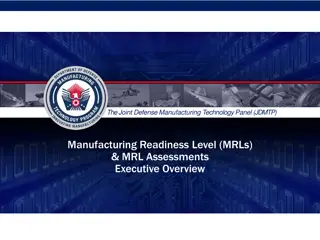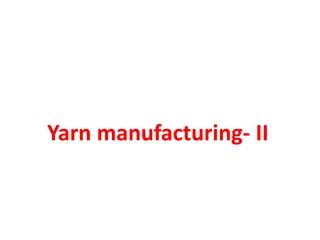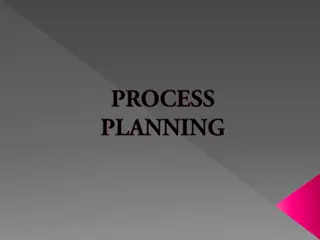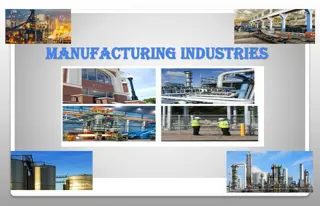Assessment of Lean Manufacturing in Palestinian Dairy Industry
This project focuses on evaluating the implementation of lean manufacturing concepts in the Palestinian dairy industry. It aims to provide a framework for enhancing lean practices and achieving clear gap analysis. The methodology includes selecting lean tools suitable for the local dairy industry, reviewing lean concepts, conducting field visits, and designing assessment tools for data collection and analysis.
Uploaded on Sep 20, 2024 | 0 Views
Download Presentation

Please find below an Image/Link to download the presentation.
The content on the website is provided AS IS for your information and personal use only. It may not be sold, licensed, or shared on other websites without obtaining consent from the author. Download presentation by click this link. If you encounter any issues during the download, it is possible that the publisher has removed the file from their server.
E N D
Presentation Transcript
An-Najah National University Faculty of Engineering & Information Technology Industrial Engineering Department Assessment of the Implementation of Lean Manufacturing Concepts in the Palestinian Dairy Industry Supervisor: Dr. Ahmad Al- Ramahi
Our Team Asem Judeh Majd Tbaileh Baraa Ali Motaz Hindi
Problem Statement Lack of a clear understanding of lean performance and its measurement . Companies should understand the implementation of lean manufacturing concepts. Assessment is essential to identify both the and progress of lean concepts with deficiencies in firms.
Objectives This project is to assess level of implementation of lean manufacturing concepts in the Palestinian dairy industry, the project aims to satisfy the following two main: Framework for enhancing implementation of lean concepts Achieve clear gap analysis
Work of scope 1- Design assessment tool including measuring indicators fit dairy industry
Lean definition and philosophy Def: Provide clients and customers the products or services they want, at which time they wish, by using the most effective ways and fewer resources available. Philosophy There is waste in any production system. Lean manufacturing is a dynamic and continuous improvement of the system of production process. Training and education for all employees on the concept of lean manufacturing.
Lean manufacturing tools TPM Heijunka JIT Kaizen 5S Lean Tools SMED V.S.M Poka Yoke K.P.I Jidoka
Methodology Selection of lean tools that fit local diary industry Reviewing lean concept Understand lean industry Primary field visit Finalize a framework to enhance the implementation of lean concepts Design the assessment tools (Questionnaire) Data collect and analysis
Preceding knowledge of the concept of lean manufacturing knowledge of the concept of lean manufacturing NO 44.44 knowledge of the concept of lean manufacturing YES 55.56 0 10 20 30 40 50 60
Perception about benefits of lean manufacturing
Perception of facilities about factors helping to implement concepts of lean manufacturing
Perception about obstacles in implementing lean manufacturing
The structure of the Roadmap for manufacturing the assessment of level of implementation of lean in the dairy sector Data Collection Data analysis Normal distribution test No If normal Yes Transformation data to Normal dis Identify level Level 1 Level 3 Level 3
The level of facilities in term of implementing Total Productive Maintenance
Normal distribution test for T.P.M 1- level 1(low level) < - level 1 <2.35 2- - level 2 (mid level) + 2.35 level 2 4.087 3- level 3 (high level) + level 3 >4.087
Analysis of implementing lean manufacturing practices
The level of facilities in term of implementing lean manufacturing tools
Normal distribution test for Lean manufacturing tools 1- level 1(high level) < - level 1 <2.39 2- - level 2(mid level) + 2.39 level 2 3.59 3- level 3 (low level) + level 3 >3.59
The level of each plant implementing Lean Manufacturing tools
Framework to implement lean manufacturing tools Identifying vulnerable indicators in each tool. Improve vulnerable indicators in each tool. Sustain improvement to maintain each tool at the highest possible level.
Lean manufacturing indicators for AL- Rayan Factory
Sustainability to maintain each tool at the highest level
Conclusion Develop a questionnaire for the assessment of the level of implementation of lean manufacturing concept. 1. 55% of the facilities have prior knowledge about lean manufacturing, 2. 66% has a positive perception about the benefits . 3. 66% confident that they have factors help in implementing lean. 4. 11% don't have serious obstacles that prevents the implementation.
Continue For the level of implementing lean manufacturing practices (tools), we conclude the following a) Approximately 44% of the studied sample have a weakness in implementing TPM b) 100% of the studied sample have a weakness in implementing VSM c) 55 % of the studied sample have a weakness in implementing Kaizen. d) 33 % of the studied sample have a weakness in implementing 5S e) 44 % of the studied sample have a weakness in implementing Poka-Yoke f) 44 % of the studied sample have a weakness in implementing JIT g) 44 % of the studied sample have a weakness in implementing SMED. h) 77 % of the studied sample have a weakness in implementing JIDOKA. i) 66 % of the studied sample have a weakness in implementing Hijunka.
Continue There is a weakness in implementing VSM , and strong implementation of 5S tool in the local dairy sector. Framework was introduced: (1) Assessment of level of implementation. (2) Improve level of implementation of vulnerable tools. (3) Sustain improvements.
Recommendation 1- It is recommended that the Palestine federation of industries should conduct awareness campaign about the concepts of lean manufacturing and its importance to the local industries in general and dairy industries in particular. 2- Dairy industries are recommended to train their staff on how to implement the different lean manufacturing tools in their factories. 3- Dairy industries are recommended to appoint industrial engineers to help in transferring the knowledge and practices of lean manufacturing local dairy sector. 4- Dairy industries are recommended to be more open in providing real data needed for quantitative analysis; this is really necessary for the step of sustaining development in the facility. 5- As future work. it is recommended to improve the check list (questionnaire) and make it relay more on quantitative indicators in addition to qualitative indicators.
